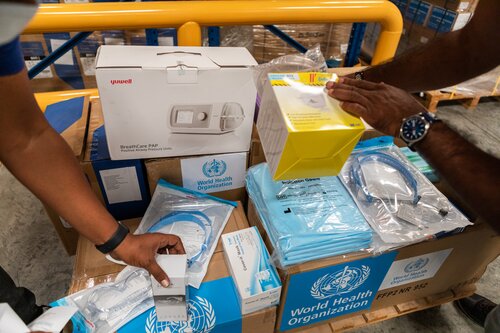On this World Health Day, we call for urgent action to realise...
4 March 2022
Conflicts and humanitarian crises pose existential risks to the right to health. We wholeheartedly join calls for peace, and appeal for uninterrupted access to health care and humanitarian assistance.

Health is a fundamental human right which is indispensable for the exercise of other human rights. Conflicts and humanitarian crises pose existential risks to the right to health. We wholeheartedly join calls for peace, and appeal for uninterrupted access to health care and humanitarian assistance.
The unfolding humanitarian catastrophe in Ukraine and neighbouring countries is a tragedy for all people facing the consequences of war. It reminds us of the hardship and suffering faced around the world by an estimated 1.6 billion people who live in conflict-affected or fragile settings. As well as direct loss of life, we are deeply concerned about disruption of essential health care. A rapid reversal of decades of progress in access to health services now seems inevitable in Ukraine. Violence puts lives at risk and forces millions of families to flee. Attacks on health workers and health facilities violate humanitarian law. At the same time, health systems everywhere have been stretched by COVID-19.
In 2019, world leaders at the UN High-level meeting on universal health coverage (UHC) committed to move towards a healthier, safer and fairer world and realise the promise of Health for All. However, even before COVID-19, the world was far short of reaching the Sustainable Development Goal target of UHC. The UHC2030 State of UHC commitment review shows that governments are not yet acting on their promises. In fragile settings, fundamental limitations in governance and legitimacy add to the challenge even before conflict disrupts health services.
We therefore call on the international community, especially world leaders involved in humanitarian and diplomatic efforts, to protect the right to health for all people in all settings. Leaders must:
- Address health needs in conflicts and humanitarian crises and ensure provision of essential health services and public health functions, in line with humanitarian principles – paying special attention to the health needs of women and girls, vulnerable and marginalized groups, and refugees and internally displaced people.
- Protect health workers, the majority of which are women, and health facilities.
- Ensure, to the fullest extent possible, timely medical care for all wounded and sick people, including specialized care for non-communicable diseases, mental health and sexual and reproductive health.
- Create safe spaces for participation and dialogue with local and regional governments, civil society and all stakeholders to ensure people’s voices are heard, irrespective of where their national governments stand. This is critical for humanitarian action, peace-building, longer-term reconstruction to respond to communities’ needs, and the multilateral response to the war and all crises to be truly inclusive.
- Act for solidarity and equity, including in fragile settings, by mobilizing well-aligned international support for resilient health systems, based on primary health care, for UHC and health security.
There is no time to lose. World leaders and the global health community must ensure respect for humanitarian principles in conflicts and fulfillment of the right to health for everyone, everywhere. This is a humanitarian imperative and moral duty.
This message is issued by UHC2030 Co-Chairs, in consultation with the following members of the UHC Movement Political Advisory Panel of UHC2030.
Co-Chair of Steering Committee, UHC2030:
- Ms. Gabriela Cuevas Barron
- Dr. Justin Koonin
UHC Movement Political Advisory Panel, UHC2030:
- Mr. Elhadj As Sy, Chair of the Board, Kofi Annan Foundation
- Ms. Emilia Saiz, Secretary General of United Cities and Local Governments
- Prof. Ilona Kickbusch, Chair, International Advisory Board, Global Health Centre, Graduate Institute for International and Development Studies Geneva
- Prof. Keizo Takemi, Member of the House of Councilors, Japan
- Ms. María Fernanda Espinosa Garcés, President of the 73rd Session of the UN General Assembly
- Dr. Vytenis Povilas Andriukaitis, Former European Commissioner for Health and Food Safety
References:
- Action on health systems, for universal coverage and health security: a UHC2030 strategic narrative to guide advocacy and action
- Why should advocates for health in fragile settings get behind UHC?
- UHC2030 policy brief: COVID-19 and fragile settings
Photo: © WHO / Blink Media - Natalie Naccache
